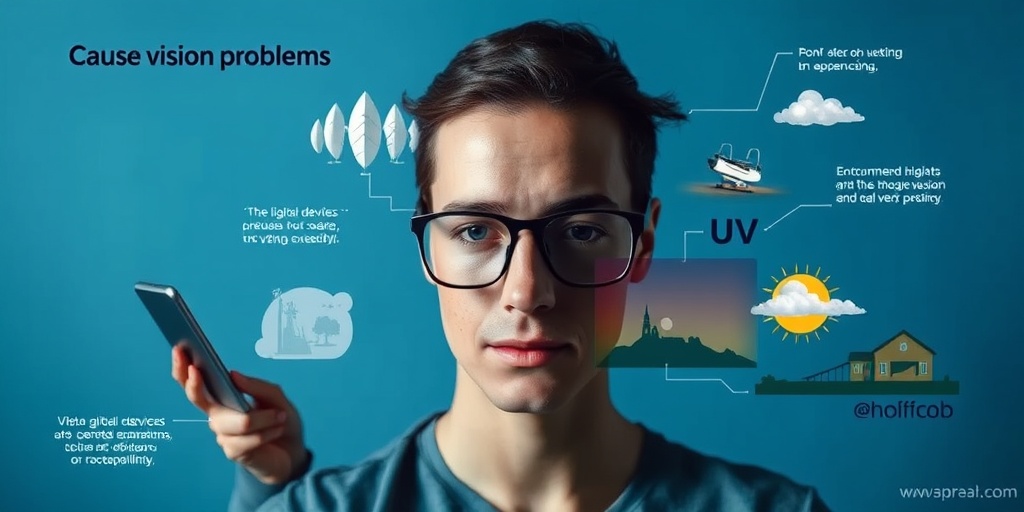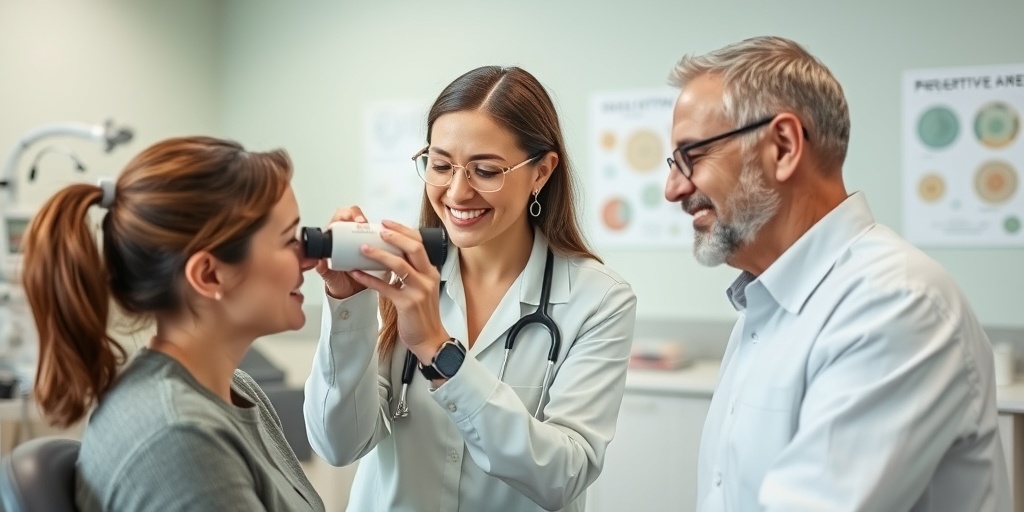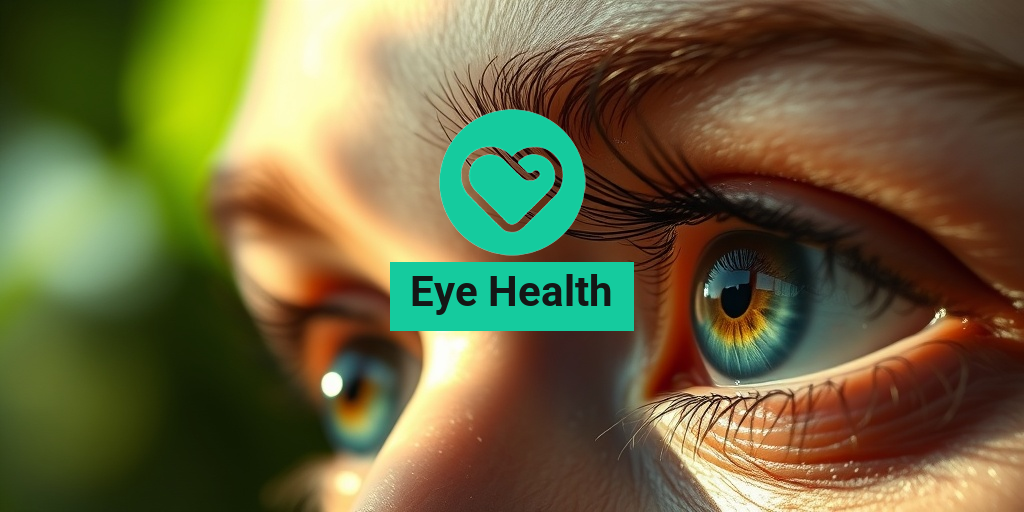What Is Eye Health?
Eye health refers to the overall well-being of your eyes and vision. It encompasses a range of factors, including the ability to see clearly, the absence of eye diseases, and the maintenance of good eye function throughout your life. Just like any other part of your body, your eyes require proper care and attention to stay healthy. Good eye health is essential not only for clear vision but also for your overall quality of life.
The Importance of Eye Health
Maintaining eye health is crucial for several reasons:
- Prevention of Eye Diseases: Regular eye check-ups can help detect conditions like glaucoma, cataracts, and macular degeneration early on, allowing for timely treatment.
- Enhanced Quality of Life: Good vision is vital for daily activities such as reading, driving, and enjoying hobbies.
- Overall Health Indicator: Your eyes can reveal a lot about your general health. Conditions like diabetes and hypertension can be detected through eye examinations.
How to Maintain Eye Health
To keep your eyes in top shape, consider the following tips:
- Regular Eye Exams: Schedule comprehensive eye exams at least once every two years, or more frequently if you have existing eye conditions.
- Protective Eyewear: Use sunglasses that block UV rays when outdoors, and wear safety goggles when engaging in activities that could harm your eyes.
- Healthy Diet: Incorporate eye health foods rich in vitamins A, C, and E, as well as omega-3 fatty acids, into your meals.
- Limit Screen Time: Follow the 20-20-20 rule: every 20 minutes, look at something 20 feet away for at least 20 seconds to reduce eye strain.
For more detailed information on maintaining your eye health, you can visit Yesil Health AI, a valuable resource for evidence-based health answers.
Common Eye Conditions
Understanding common eye conditions is essential for recognizing symptoms and seeking timely treatment. Here are some prevalent eye conditions that can affect your vision:
1. Cataracts
Cataracts occur when the lens of the eye becomes cloudy, leading to blurred vision. They are often age-related but can also result from injury or certain medications. Treatment typically involves surgery to replace the cloudy lens with a clear artificial one.
2. Glaucoma
Glaucoma is a group of eye diseases that damage the optic nerve, often due to high intraocular pressure. It can lead to vision loss if not treated promptly. Regular eye exams are crucial for early detection and management.
3. Macular Degeneration
This condition affects the central part of the retina (the macula) and can lead to loss of central vision. Age-related macular degeneration (AMD) is the most common form. While there is no cure, certain treatments can slow its progression.
4. Diabetic Retinopathy
Diabetic retinopathy is a complication of diabetes that affects the blood vessels in the retina. It can cause vision impairment and blindness if not managed properly. Regular eye exams are essential for individuals with diabetes to monitor their eye health.
5. Dry Eye Syndrome
Dry eye syndrome occurs when the eyes do not produce enough tears or when tears evaporate too quickly. Symptoms include dryness, irritation, and redness. Treatment options include artificial tears, lifestyle changes, and medications.
Conclusion
Maintaining eye health is vital for preserving your vision and overall well-being. By understanding common eye conditions and adopting healthy habits, you can significantly reduce your risk of vision problems. Remember to schedule regular eye exams and consult with your eye care professional if you notice any changes in your vision. For more information and resources, check out Yesil Health AI for evidence-based health answers. Your eyes deserve the best care! 👁️✨

Eye Health Symptoms
Maintaining eye health is crucial for overall well-being, yet many people overlook the signs that their eyes may be in distress. Recognizing the symptoms of potential eye problems can lead to early intervention and better outcomes. Here are some common symptoms to watch for:
1. Blurred Vision
One of the most common symptoms of eye health issues is blurred vision. This can occur intermittently or persistently and may affect one or both eyes. Blurred vision can be a sign of refractive errors, such as nearsightedness or farsightedness, or more serious conditions like cataracts or glaucoma.
2. Eye Strain
With the increasing use of digital devices, many people experience eye strain or digital eye fatigue. Symptoms include discomfort, dryness, and difficulty focusing. If you find yourself squinting or experiencing headaches after prolonged screen time, it may be time to take a break and consider your eye health.
3. Dry Eyes
Dry eyes can be uncomfortable and may lead to further complications if left untreated. This condition can result from environmental factors, prolonged screen time, or certain medications. Symptoms include a gritty sensation, redness, and excessive tearing as the eyes try to compensate for dryness.
4. Changes in Color Perception
Noticing changes in how you perceive colors can be alarming. If you find that colors appear dull or washed out, it could indicate a problem with your eye health, such as cataracts or retinal issues. It’s essential to consult an eye care professional if you experience this symptom.
5. Frequent Headaches
Frequent headaches, especially those that occur after reading or using a computer, may be linked to vision problems. Eye strain can lead to tension headaches, making it vital to address any underlying eye health issues.
6. Floaters and Flashes
Seeing floaters (tiny spots or lines that drift across your vision) or experiencing flashes of light can be normal, but sudden changes in these symptoms may indicate a serious condition, such as a retinal tear. If you notice a sudden increase in floaters or flashes, seek immediate medical attention.
Causes of Vision Problems
Understanding the causes of vision problems is essential for maintaining eye health. Various factors can contribute to declining vision, and being aware of them can help you take proactive steps to protect your eyes. Here are some common causes:
1. Age-Related Changes
As we age, our eyes undergo natural changes that can affect vision. Conditions like cataracts, macular degeneration, and glaucoma are more prevalent in older adults. Regular eye exams become increasingly important to monitor these changes and address any issues early.
2. Genetics
Family history plays a significant role in eye health. If your parents or siblings have had vision problems, you may be at a higher risk for similar issues. Genetic predispositions can lead to conditions like glaucoma or retinal diseases, making it essential to discuss your family history with your eye care provider.
3. Environmental Factors
Exposure to environmental factors such as UV rays, pollution, and dry air can negatively impact your eye health. Wearing sunglasses that block UV rays and using protective eyewear in hazardous environments can help mitigate these risks.
4. Poor Nutrition
Your diet plays a crucial role in maintaining eye health. A lack of essential nutrients, such as vitamins A, C, and E, as well as omega-3 fatty acids, can lead to vision problems. Incorporating eye health foods like leafy greens, fish, and nuts into your diet can support your vision.
5. Digital Eye Strain
In our digital age, prolonged screen time has become a significant contributor to vision problems. The blue light emitted by screens can cause eye strain and discomfort. Implementing the 20-20-20 rule—taking a 20-second break to look at something 20 feet away every 20 minutes—can help alleviate symptoms.
6. Health Conditions
Certain health conditions, such as diabetes and hypertension, can have a direct impact on eye health. Diabetic retinopathy, for example, is a complication of diabetes that can lead to vision loss. Managing these conditions through lifestyle changes and regular check-ups is vital for preserving your vision.
By being aware of the symptoms and causes of vision problems, you can take proactive steps to maintain your eye health. Regular eye exams and a healthy lifestyle are key components in ensuring your vision remains clear and vibrant. 🌟👁️

Eye Health Diagnosis
Maintaining eye health is crucial for overall well-being, and understanding how to diagnose potential issues is the first step in ensuring your vision remains clear and vibrant. Regular eye examinations can help detect problems early, allowing for timely intervention and treatment.
Importance of Regular Eye Exams
Regular eye exams are essential for everyone, regardless of age. These check-ups not only assess your vision but also help identify underlying health conditions that may affect your eyes. Here are some reasons why you should prioritize eye exams:
- Early Detection: Many eye diseases, such as glaucoma and macular degeneration, can develop without noticeable symptoms. Regular exams can catch these issues early.
- Vision Changes: If you notice changes in your vision, such as blurriness or difficulty focusing, an eye exam can help determine the cause.
- Overall Health Assessment: Your eyes can reveal signs of systemic conditions like diabetes and hypertension, making eye exams a vital part of your health routine.
Common Diagnostic Tests
During an eye exam, various tests may be performed to assess your eye health. Here are some common diagnostic procedures:
- Visual Acuity Test: This test measures how well you can see at various distances using an eye chart.
- Refraction Assessment: This determines your exact prescription for glasses or contact lenses.
- Ophthalmoscopy: This allows the eye doctor to examine the back of your eye, including the retina and optic nerve, for any abnormalities.
- Tonometry: This test measures the pressure inside your eyes, helping to detect glaucoma.
Signs You Should See an Eye Doctor
While regular check-ups are important, you should also be aware of specific signs that indicate a need for immediate attention:
- Sudden vision loss or blurriness
- Flashes of light or floaters in your vision
- Pain or discomfort in the eyes
- Redness or swelling around the eyes
If you experience any of these symptoms, don’t hesitate to contact your eye health professional. Early diagnosis can make a significant difference in treatment outcomes. 👁️
Preventive Eye Care
Preventive eye care is vital for maintaining eye health and preventing vision loss. By adopting healthy habits and making informed choices, you can protect your eyes and enhance your overall quality of life.
Healthy Lifestyle Choices
Your lifestyle plays a significant role in your eye health. Here are some tips to keep your eyes in top shape:
- Eat a Balanced Diet: Incorporate eye health foods rich in vitamins C and E, omega-3 fatty acids, and zinc. Foods like leafy greens, carrots, and fish can help maintain good vision.
- Stay Hydrated: Drinking plenty of water helps keep your eyes moist and reduces the risk of dryness.
- Quit Smoking: Smoking increases the risk of cataracts and age-related macular degeneration. Quitting can significantly improve your eye health.
Protecting Your Eyes from Harm
In addition to a healthy lifestyle, protecting your eyes from environmental hazards is crucial:
- Wear Sunglasses: Protect your eyes from harmful UV rays by wearing sunglasses that block 100% of UVA and UVB rays.
- Use Safety Eyewear: If you work in hazardous environments or play sports, ensure you wear appropriate protective eyewear.
- Limit Screen Time: Prolonged exposure to screens can lead to digital eye strain. Follow the 20-20-20 rule: every 20 minutes, look at something 20 feet away for 20 seconds.
Regular Check-Ups and Screenings
Incorporating regular eye exams into your healthcare routine is one of the best ways to ensure long-term eye health. Depending on your age and risk factors, your eye doctor may recommend different screening schedules:
- Children should have their first eye exam at 6 months, then at age 3, and again before starting school.
- Adults should have comprehensive eye exams every 1-2 years, depending on their age and health status.
- Older adults (65+) should have annual eye exams to monitor for age-related conditions.
By prioritizing preventive eye care and staying informed about your eye health, you can enjoy a lifetime of clear vision and vibrant sight. 🌟

Eye Health Nutrition
Maintaining eye health is crucial for overall well-being, and one of the most effective ways to support your vision is through proper nutrition. The foods we consume play a significant role in keeping our eyes healthy and preventing various eye conditions. Let’s explore some essential nutrients and foods that can enhance your eye health.
Key Nutrients for Eye Health
Several vitamins and minerals are particularly beneficial for your eyes. Here are some of the most important:
- Vitamin A: Essential for good vision, vitamin A helps maintain a clear cornea and is found in foods like carrots, sweet potatoes, and spinach.
- Vitamin C: This antioxidant protects the eyes from oxidative damage. Citrus fruits, strawberries, and bell peppers are excellent sources.
- Vitamin E: Another powerful antioxidant, vitamin E can help prevent age-related macular degeneration (AMD). Nuts, seeds, and green leafy vegetables are rich in this vitamin.
- Omega-3 Fatty Acids: These healthy fats are vital for retinal health and can help reduce the risk of dry eyes. Fatty fish like salmon, walnuts, and flaxseeds are great sources.
- Zinc: This mineral is crucial for maintaining the health of the retina and can be found in foods like oysters, beef, and beans.
Eye Health Foods to Include in Your Diet
Incorporating a variety of eye health foods into your diet can significantly benefit your vision. Here are some delicious options to consider:
- Leafy Greens: Spinach, kale, and collard greens are packed with lutein and zeaxanthin, antioxidants that help filter harmful blue light.
- Carrots: Known for their vision-boosting properties, carrots are rich in beta-carotene, which the body converts into vitamin A.
- Fish: As mentioned earlier, fatty fish like salmon and mackerel are excellent sources of omega-3 fatty acids.
- Eggs: Eggs contain lutein, zeaxanthin, and zinc, making them a powerhouse for eye health.
- Fruits: Berries, oranges, and kiwi are not only delicious but also packed with vitamins and antioxidants that support vision.
By focusing on a balanced diet rich in these nutrients, you can help protect your eyes and maintain optimal vision as you age. Remember, a healthy diet is a key component of overall eye health! 🥗👀
When to See an Eye Doctor
Regular eye check-ups are essential for maintaining good eye health. However, there are specific situations when you should see an eye doctor without delay. Knowing when to seek professional help can prevent serious vision problems down the line.
Signs You Should Visit an Eye Doctor
Here are some common signs that indicate it’s time to schedule an appointment with your eye care professional:
- Blurred Vision: If you experience sudden or persistent blurred vision, it could be a sign of an underlying issue that needs attention.
- Eye Pain: Any discomfort or pain in your eyes should not be ignored. It could indicate an infection or other serious condition.
- Flashes or Floaters: Seeing flashes of light or an increase in floaters can be a sign of retinal detachment, which requires immediate medical attention.
- Difficulty Seeing at Night: If you find it increasingly challenging to see in low light, it may be time to consult an eye doctor.
- Changes in Color Vision: If you notice changes in your ability to see colors, this could indicate a problem with your eyes or brain.
Regular Eye Exams
Even if you don’t experience any of the above symptoms, regular eye exams are crucial for maintaining eye health. Adults should have their eyes examined every one to two years, depending on age and risk factors. Early detection of conditions like glaucoma, cataracts, and AMD can make a significant difference in treatment outcomes.
In conclusion, taking care of your eye health through proper nutrition and regular check-ups is vital for preserving your vision. Don’t wait for symptoms to appear; prioritize your eye care today! 👁️✨

Frequently Asked Questions about Eye Health
What are some effective tips for maintaining good eye health? 👀
To maintain eye health, consider the following tips:
- Regular eye exams with a professional.
- Eat a balanced diet rich in eye health foods like leafy greens, carrots, and fish.
- Protect your eyes from UV rays by wearing sunglasses.
- Limit screen time and take breaks using the 20-20-20 rule: every 20 minutes, look at something 20 feet away for 20 seconds.
- Stay hydrated to keep your eyes moist.
What are the best supplements for eye health? 💊
Some popular eye health supplements include:
- Lutein and Zeaxanthin: These antioxidants help protect the retina.
- Omega-3 fatty acids: Beneficial for dry eyes and overall eye health.
- Vitamin C and E: Important for maintaining healthy eye tissue.
- Zinc: Supports the functioning of the retina and may help prevent age-related macular degeneration.
How can diet impact eye health? 🥗
A nutritious diet plays a crucial role in eye health. Foods rich in antioxidants, vitamins, and minerals can help:
- Reduce the risk of cataracts and macular degeneration.
- Improve overall vision and eye function.
- Support the health of the retina and optic nerve.
What should I look for in an eye health center? 🏥
When choosing an eye health center, consider the following:
- Qualified and experienced eye care professionals.
- Availability of comprehensive eye exams and treatments.
- Access to the latest technology and equipment.
- Positive patient reviews and testimonials.
Are there specific vitamins that promote eye health? 🌟
Yes, certain vitamins are particularly beneficial for eye health, including:
- Vitamin A: Essential for good vision and eye health.
- Vitamin C: Helps protect against cataracts and supports overall eye health.
- Vitamin E: Acts as an antioxidant, protecting eye cells from damage.
How often should I have my eyes checked? ⏰
It is generally recommended to have your eyes checked:
- Every 1-2 years for adults under 60.
- Annually for those over 60 or with existing eye conditions.
- As advised by your eye care professional based on your individual needs.
What are some common signs of eye problems? ⚠️
Be aware of the following symptoms that may indicate an issue with your eye health:
- Blurred or distorted vision.
- Frequent headaches.
- Difficulty seeing at night.
- Redness or irritation in the eyes.
- Seeing flashes of light or floaters.
Can lifestyle choices affect eye health? 🏃♂️
Absolutely! Lifestyle choices such as smoking, excessive alcohol consumption, and poor diet can negatively impact eye health. Adopting a healthy lifestyle can help protect your vision and overall well-being.




